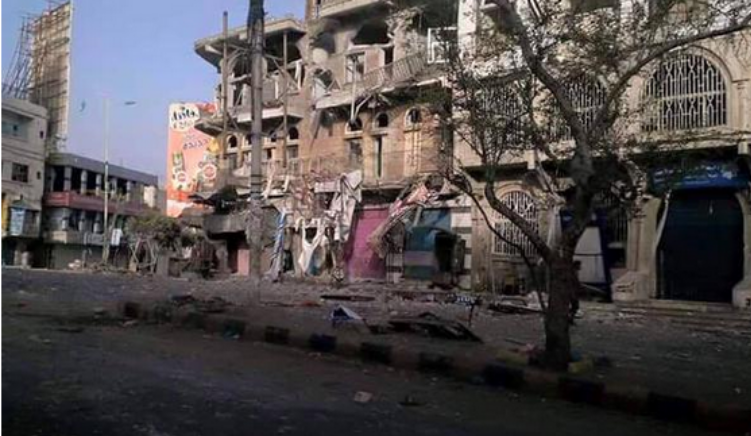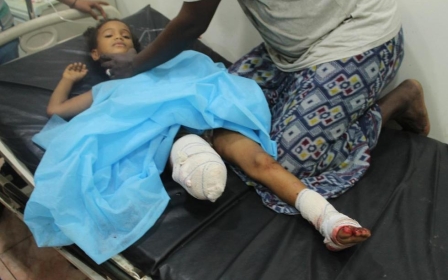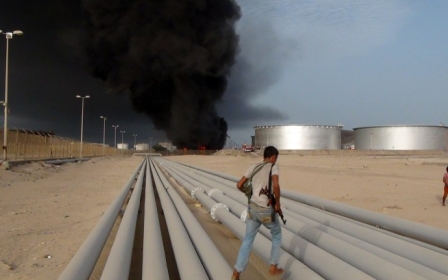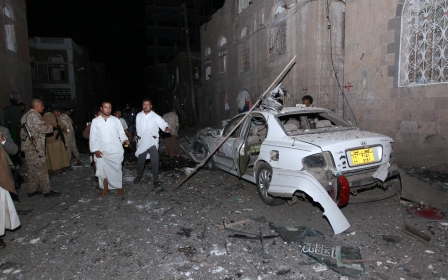Houthis besiege Aden as organisations struggle to deliver humanitarian aid

Since late March 2015, violent clashes in Aden province have not calmed as Houthis fight to take over province. They are being met with strong resistance by the groups like The Popular Resistance in Aden, coupled with Saudi-led airstrikes.
Under the banner of resisting Al-Qaeda and the Islamic State, the Houthis continue fighting, and attempted a take-over of Aden after President Adbu Rabo Mansoor heard of the impending siege and fled to his home in Sanaa.
Today, nearly half of Aden's population is displaced and seeking shelter in any available space in the town, according to the International Committee of the Red Cross (ICRC).
The price of food has skyrocketed due to the fighting and hindrances have been put in place by the warring parties that prevent goods from reaching Aden. Most of the stores are closed or have only a few items to sell. And even if there were goods to be bought and sold, the intense fighting makes it impossible for people to get to the market. As a result, the majority of the city's population, more than one million, relies on humanitarian aid, said ICRC on Thursday.
Essam Al-Shaeri, the head of the Aden-based Sah Foundation for Defending Rights and Freedom, told Middle East Eye that the only way for Aden's residents to get basic goods is through the black market, stating that the price for a bag of wheat, which used to cost YR 5,000 (US $23) has skyrocketed to YR 15,000 ($70).
New MEE newsletter: Jerusalem Dispatch
Sign up to get the latest insights and analysis on Israel-Palestine, alongside Turkey Unpacked and other MEE newsletters
"Humanitarian aid usually fell into the hands of Houthis, who would in turn take this aid and sell it to the black market. I myself buy wheat from the black market. It's the only way to get basic goods. Otherwise, we would die." Al-Shaeri added that the situation has worsened as the Houthis have gained control of all of the points of entry to Aden and care little for the humanitarian situation of its residents.
Last Thursday, the ICRC began distributing food across the front lines in Aden. The consignment of more than 160 tons would cover the emergency needs of 17,500 people, according to the spokesperson of ICRC in Yemen, Adnan Hizam.
Hizam told MEE that the ICRC has several teams in Aden and distribute aid to both Houthis and anti-Houthis, "The most important thing for us is that we deliver the aid to the people, we do not care if they are Houthis or not, our work is humanitarian and not political."
The food was part of a seven-truck convoy that reached Aden on 30 June, also carrying hygiene kits for the population to help prevent the spread of disease, according to Hizam.
Some of the activists in Aden accused the humanitarian organisations of providing the northern provinces with aid while the southern provinces were still suffering. But Hizam stressed that there was no discrimination between provinces.
"The food parcels distributed these days will not, by far, respond to all the need. We want to address more of the populations' immediate needs and call on all parties to allow us to do so. Parties must meet their obligations under international humanitarian law and ensure that civilians can safely access clean water, food and healthcare," said Robert Zimmerman, who heads the ICRC Sub-Delegation in Aden in a report published on ICRC’s website on Thursday.
Zimmerman stated that in today's environment, something as basic as the distributon of food remains a significant challenge, but they will continue to coordinate with all armed groups present in Aden to ensure that emergency aid is delivered impartially to all who are in need.
The ICRC is not the only organisation that reached Aden; there are several organisations that arrived in Aden during the past week, including the humanitarian aid organisation, Islamic Relief.
Sadaam Al-Abdini, assistant program manager of the Yemen branch of Islamic Relief, told MEE that they have a team in Aden that is responsible for distributing aid, and this team delivers the aid directly to the people, regardless of political or military affiliation.
"Our team in Aden is working hard to coordinate with the conflicting parties to allow them to distribute the aid to the people from both sides." Al-Abdini stressed.
A member of the Houthis political office, Mohammed Al-Boukhaiti, spoke to MEE and denied the charge that Houthis seize this humanitarian aid, but he did confirm that Houthi forces took over a large area of Aden province.
"Most Yemenis know that Houthis have taken over Aden province, but there are no organisations that are willing to acknowledge it," Al-Shaeri added.
The struggle to flee Aden
As conditions deteriorate in Aden, many people are trying to flee the province; many have fled to Hadramout province and other neighbouring areas. Others can’t seem to find a way out.
Mazen Abdulghani is originally from Taiz, but he has lived in Aden since 2006. He works there as an accountant with a local foundation. When the war came to Aden in late March, he thought that the war would come to an end within a matter or weeks. He decided to stay in the city and wait it out.
When the war intensified last month, he tried to flee Aden towards Taiz, but it was difficult because he didn’t have a car. He needed to rent a vehicle to get his wife and daughter out of Aden.
"When I inquired on the price of renting a car from Aden to Taiz, I found it would cost YR100,000 ($465). I didn't have that much money, so I decided to stay in my home in Aden's Al-Mansoura district, waiting for my fate and hoping to find a way to rent a car,” Abdulghani told MEE.
Few people travel from Aden to other provinces due to the dangers of the journey. Houthis and fighters with the Popular Resistance, as well as Saudi-led airstrikes, target vehicles on these roads.
"The drivers of the buses and cars who transport people out of Aden take risks, and this is the primary reason that transport costs so much,” Abdulghani said, adding that the typical cost for transport from Aden to Taiz is around YR20,000 ($93), but the war inflated the price to YR100,000 ($465). Abdulghani had no choice but to wait in Aden.
Yemen at highest crisis level
The United Nations on Wednesday raised Yemen to the highest-level of humanitarian crisis, placing it alongside emergencies in South Sudan, Syria and Iraq.
"More than 21.1 million people, over 80 percent of Yemen's population, now need some form of humanitarian assistance," UN spokesperson Farhan Haq said on Wednesday.
The United Nations also said in a report on Tuesday that an average of 150 new cases of Dengue Fever and around 11 deaths were being reported daily. The United Nations quoted Aden health officials as saying that 8,000 people had contracted Dengue Fever in Aden since the crisis began in March.
The UN report also said that 590 have died from the disease, five times what was reported two weeks ago
The primary reason for the swift spread of the disease is the temperatures that reach as high as 37 degrees Celcius in some provinces. There is no electricity to operate air-conditioners or fans, and this facilitates the spread of the disease, Dr Akram Ameen, a physician in Al-Kuwait run-state hospital in Sanaa told MEE.
For this reason, many have left Aden province for other provinces such as the capital Sanaa. Abdurrahman Al-Somali, a resident of Aden, fled to Sanaa. He said this journey saved his life.
"Aden is not a suitable city to live in, if you don't die from gun shells, you will die from disease. This is why we left our house in Aden and came to Sanaa, though we have never lived outside of Aden," he explained to MEE.
Al-Somali said that he left Aden along with his mother, brother, two sisters and the children of his brother, explaining that they feared Dengue Fever more than the clashes in Aden.
Middle East Eye delivers independent and unrivalled coverage and analysis of the Middle East, North Africa and beyond. To learn more about republishing this content and the associated fees, please fill out this form. More about MEE can be found here.




